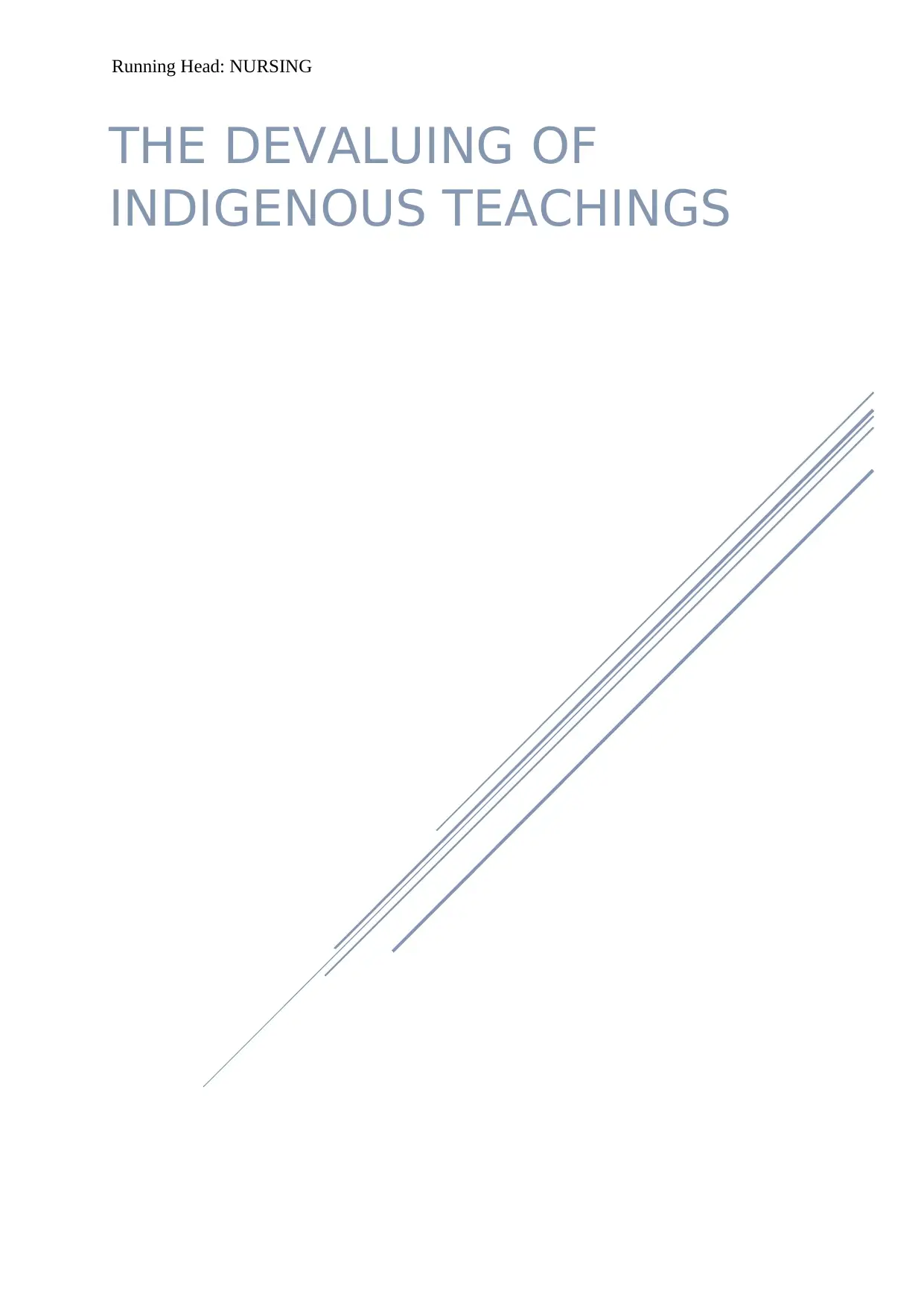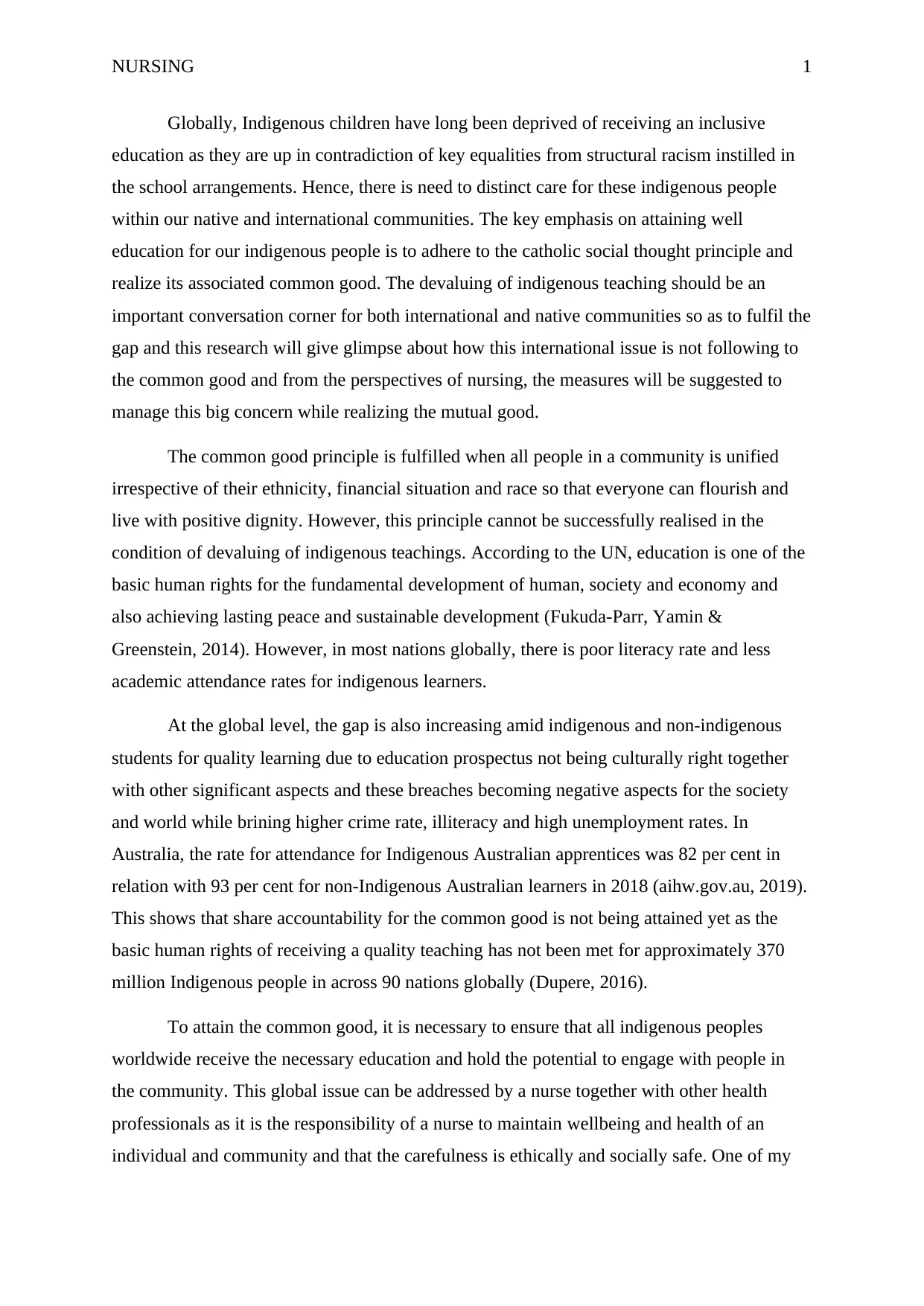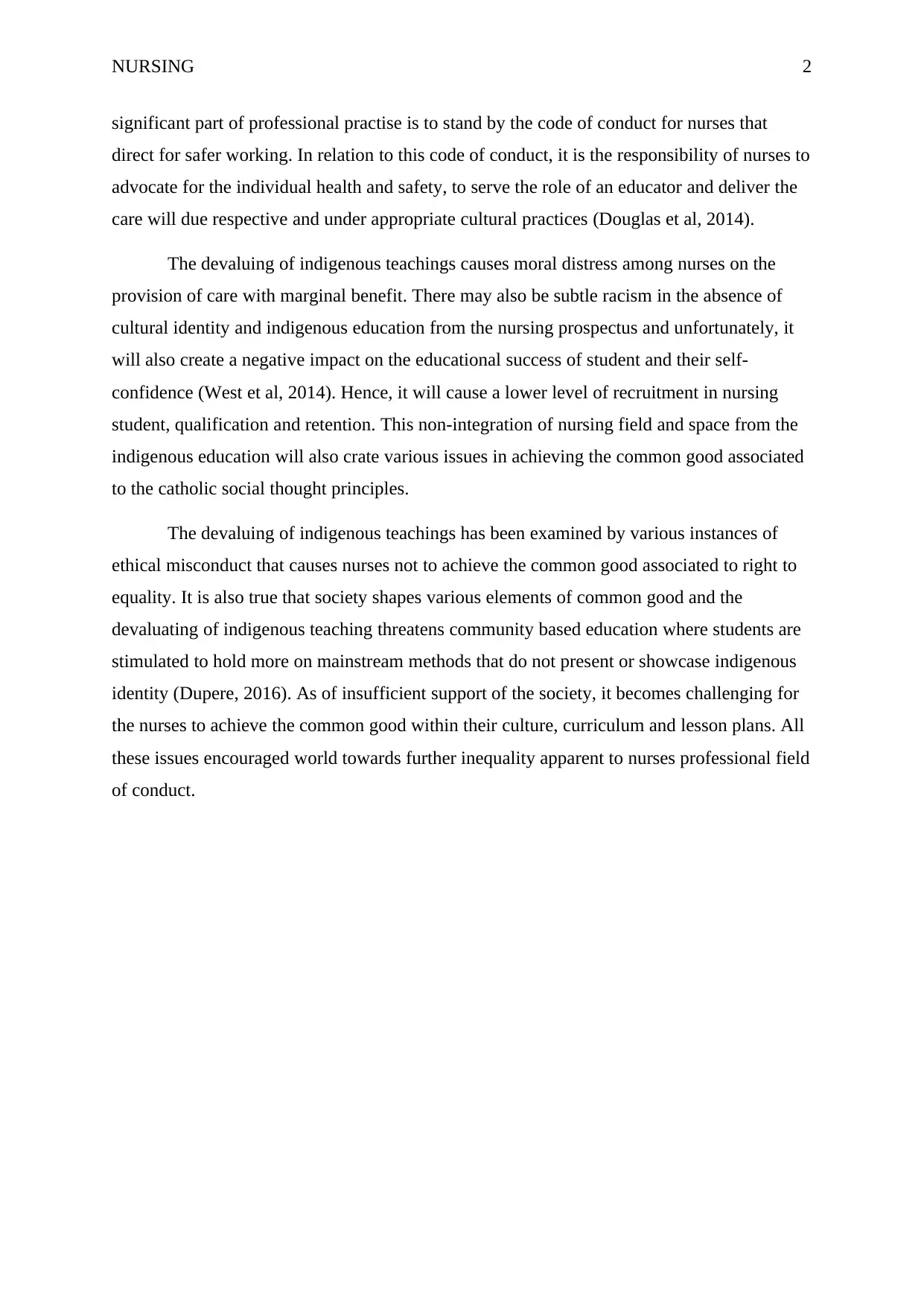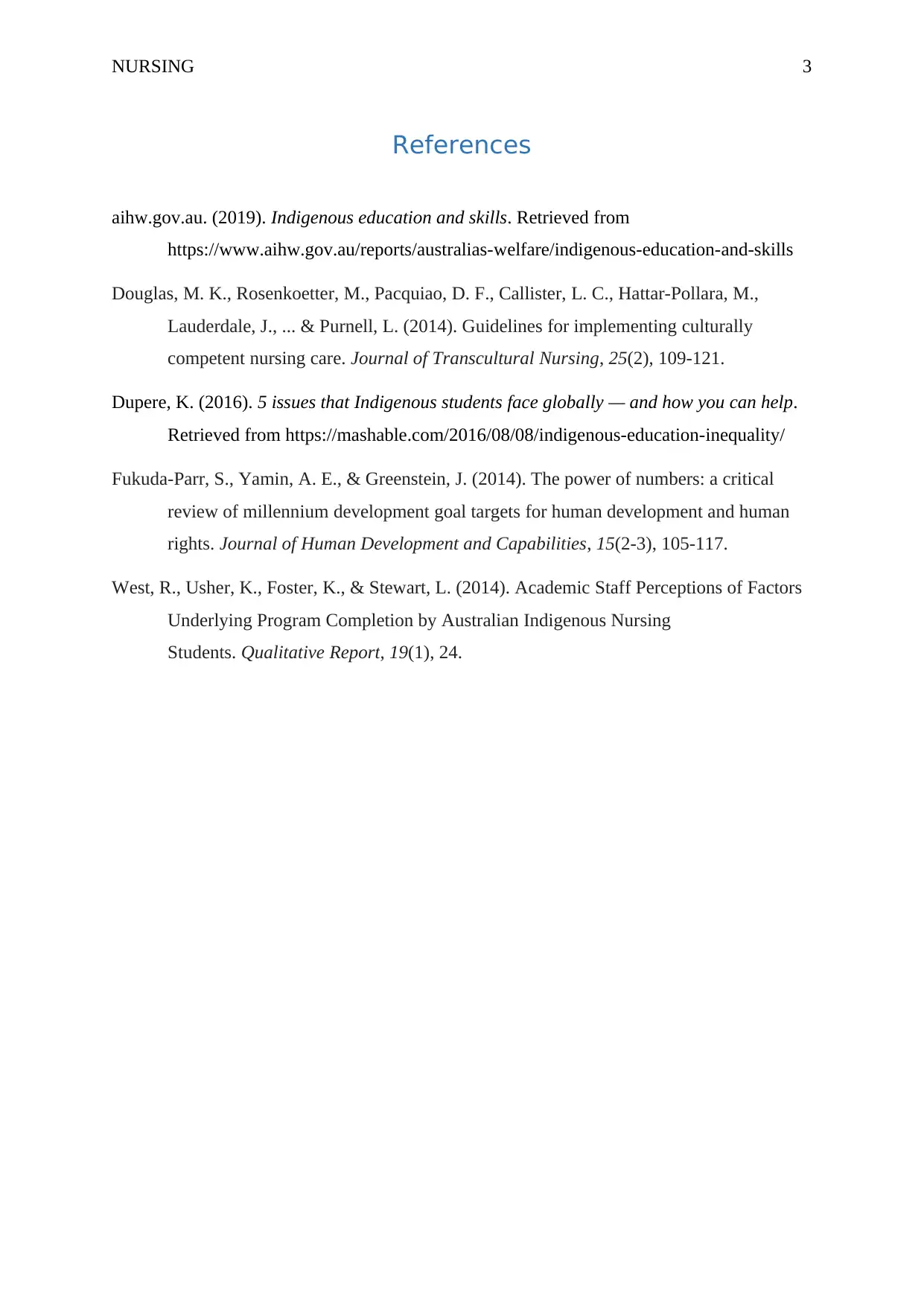Challenges of Devaluing Indigenous Teachings in Nursing, UNCC300
VerifiedAdded on 2022/09/26
|4
|977
|19
Essay
AI Summary
This essay critically analyzes the challenges associated with the devaluing of indigenous teachings, particularly within the nursing profession, in the context of UNCC300. It highlights the ethical and societal implications of neglecting indigenous education, including poor literacy rates, lower attendance, and the widening gap between indigenous and non-indigenous students. The essay emphasizes the importance of adhering to the Catholic social thought principle of the common good, advocating for inclusive education to address inequalities and promote positive dignity for all. It explores the nurses' role in advocating for the health and safety of indigenous communities and suggests measures to manage this global concern while realizing the mutual good. The paper references various sources to support its arguments, including the impact on educational success, self-confidence, and recruitment within the nursing field.

Running Head: NURSING
THE DEVALUING OF
INDIGENOUS TEACHINGS
THE DEVALUING OF
INDIGENOUS TEACHINGS
Paraphrase This Document
Need a fresh take? Get an instant paraphrase of this document with our AI Paraphraser

NURSING 1
Globally, Indigenous children have long been deprived of receiving an inclusive
education as they are up in contradiction of key equalities from structural racism instilled in
the school arrangements. Hence, there is need to distinct care for these indigenous people
within our native and international communities. The key emphasis on attaining well
education for our indigenous people is to adhere to the catholic social thought principle and
realize its associated common good. The devaluing of indigenous teaching should be an
important conversation corner for both international and native communities so as to fulfil the
gap and this research will give glimpse about how this international issue is not following to
the common good and from the perspectives of nursing, the measures will be suggested to
manage this big concern while realizing the mutual good.
The common good principle is fulfilled when all people in a community is unified
irrespective of their ethnicity, financial situation and race so that everyone can flourish and
live with positive dignity. However, this principle cannot be successfully realised in the
condition of devaluing of indigenous teachings. According to the UN, education is one of the
basic human rights for the fundamental development of human, society and economy and
also achieving lasting peace and sustainable development (Fukuda-Parr, Yamin &
Greenstein, 2014). However, in most nations globally, there is poor literacy rate and less
academic attendance rates for indigenous learners.
At the global level, the gap is also increasing amid indigenous and non-indigenous
students for quality learning due to education prospectus not being culturally right together
with other significant aspects and these breaches becoming negative aspects for the society
and world while brining higher crime rate, illiteracy and high unemployment rates. In
Australia, the rate for attendance for Indigenous Australian apprentices was 82 per cent in
relation with 93 per cent for non-Indigenous Australian learners in 2018 (aihw.gov.au, 2019).
This shows that share accountability for the common good is not being attained yet as the
basic human rights of receiving a quality teaching has not been met for approximately 370
million Indigenous people in across 90 nations globally (Dupere, 2016).
To attain the common good, it is necessary to ensure that all indigenous peoples
worldwide receive the necessary education and hold the potential to engage with people in
the community. This global issue can be addressed by a nurse together with other health
professionals as it is the responsibility of a nurse to maintain wellbeing and health of an
individual and community and that the carefulness is ethically and socially safe. One of my
Globally, Indigenous children have long been deprived of receiving an inclusive
education as they are up in contradiction of key equalities from structural racism instilled in
the school arrangements. Hence, there is need to distinct care for these indigenous people
within our native and international communities. The key emphasis on attaining well
education for our indigenous people is to adhere to the catholic social thought principle and
realize its associated common good. The devaluing of indigenous teaching should be an
important conversation corner for both international and native communities so as to fulfil the
gap and this research will give glimpse about how this international issue is not following to
the common good and from the perspectives of nursing, the measures will be suggested to
manage this big concern while realizing the mutual good.
The common good principle is fulfilled when all people in a community is unified
irrespective of their ethnicity, financial situation and race so that everyone can flourish and
live with positive dignity. However, this principle cannot be successfully realised in the
condition of devaluing of indigenous teachings. According to the UN, education is one of the
basic human rights for the fundamental development of human, society and economy and
also achieving lasting peace and sustainable development (Fukuda-Parr, Yamin &
Greenstein, 2014). However, in most nations globally, there is poor literacy rate and less
academic attendance rates for indigenous learners.
At the global level, the gap is also increasing amid indigenous and non-indigenous
students for quality learning due to education prospectus not being culturally right together
with other significant aspects and these breaches becoming negative aspects for the society
and world while brining higher crime rate, illiteracy and high unemployment rates. In
Australia, the rate for attendance for Indigenous Australian apprentices was 82 per cent in
relation with 93 per cent for non-Indigenous Australian learners in 2018 (aihw.gov.au, 2019).
This shows that share accountability for the common good is not being attained yet as the
basic human rights of receiving a quality teaching has not been met for approximately 370
million Indigenous people in across 90 nations globally (Dupere, 2016).
To attain the common good, it is necessary to ensure that all indigenous peoples
worldwide receive the necessary education and hold the potential to engage with people in
the community. This global issue can be addressed by a nurse together with other health
professionals as it is the responsibility of a nurse to maintain wellbeing and health of an
individual and community and that the carefulness is ethically and socially safe. One of my

NURSING 2
significant part of professional practise is to stand by the code of conduct for nurses that
direct for safer working. In relation to this code of conduct, it is the responsibility of nurses to
advocate for the individual health and safety, to serve the role of an educator and deliver the
care will due respective and under appropriate cultural practices (Douglas et al, 2014).
The devaluing of indigenous teachings causes moral distress among nurses on the
provision of care with marginal benefit. There may also be subtle racism in the absence of
cultural identity and indigenous education from the nursing prospectus and unfortunately, it
will also create a negative impact on the educational success of student and their self-
confidence (West et al, 2014). Hence, it will cause a lower level of recruitment in nursing
student, qualification and retention. This non-integration of nursing field and space from the
indigenous education will also crate various issues in achieving the common good associated
to the catholic social thought principles.
The devaluing of indigenous teachings has been examined by various instances of
ethical misconduct that causes nurses not to achieve the common good associated to right to
equality. It is also true that society shapes various elements of common good and the
devaluating of indigenous teaching threatens community based education where students are
stimulated to hold more on mainstream methods that do not present or showcase indigenous
identity (Dupere, 2016). As of insufficient support of the society, it becomes challenging for
the nurses to achieve the common good within their culture, curriculum and lesson plans. All
these issues encouraged world towards further inequality apparent to nurses professional field
of conduct.
significant part of professional practise is to stand by the code of conduct for nurses that
direct for safer working. In relation to this code of conduct, it is the responsibility of nurses to
advocate for the individual health and safety, to serve the role of an educator and deliver the
care will due respective and under appropriate cultural practices (Douglas et al, 2014).
The devaluing of indigenous teachings causes moral distress among nurses on the
provision of care with marginal benefit. There may also be subtle racism in the absence of
cultural identity and indigenous education from the nursing prospectus and unfortunately, it
will also create a negative impact on the educational success of student and their self-
confidence (West et al, 2014). Hence, it will cause a lower level of recruitment in nursing
student, qualification and retention. This non-integration of nursing field and space from the
indigenous education will also crate various issues in achieving the common good associated
to the catholic social thought principles.
The devaluing of indigenous teachings has been examined by various instances of
ethical misconduct that causes nurses not to achieve the common good associated to right to
equality. It is also true that society shapes various elements of common good and the
devaluating of indigenous teaching threatens community based education where students are
stimulated to hold more on mainstream methods that do not present or showcase indigenous
identity (Dupere, 2016). As of insufficient support of the society, it becomes challenging for
the nurses to achieve the common good within their culture, curriculum and lesson plans. All
these issues encouraged world towards further inequality apparent to nurses professional field
of conduct.
⊘ This is a preview!⊘
Do you want full access?
Subscribe today to unlock all pages.

Trusted by 1+ million students worldwide

NURSING 3
References
aihw.gov.au. (2019). Indigenous education and skills. Retrieved from
https://www.aihw.gov.au/reports/australias-welfare/indigenous-education-and-skills
Douglas, M. K., Rosenkoetter, M., Pacquiao, D. F., Callister, L. C., Hattar-Pollara, M.,
Lauderdale, J., ... & Purnell, L. (2014). Guidelines for implementing culturally
competent nursing care. Journal of Transcultural Nursing, 25(2), 109-121.
Dupere, K. (2016). 5 issues that Indigenous students face globally — and how you can help.
Retrieved from https://mashable.com/2016/08/08/indigenous-education-inequality/
Fukuda-Parr, S., Yamin, A. E., & Greenstein, J. (2014). The power of numbers: a critical
review of millennium development goal targets for human development and human
rights. Journal of Human Development and Capabilities, 15(2-3), 105-117.
West, R., Usher, K., Foster, K., & Stewart, L. (2014). Academic Staff Perceptions of Factors
Underlying Program Completion by Australian Indigenous Nursing
Students. Qualitative Report, 19(1), 24.
References
aihw.gov.au. (2019). Indigenous education and skills. Retrieved from
https://www.aihw.gov.au/reports/australias-welfare/indigenous-education-and-skills
Douglas, M. K., Rosenkoetter, M., Pacquiao, D. F., Callister, L. C., Hattar-Pollara, M.,
Lauderdale, J., ... & Purnell, L. (2014). Guidelines for implementing culturally
competent nursing care. Journal of Transcultural Nursing, 25(2), 109-121.
Dupere, K. (2016). 5 issues that Indigenous students face globally — and how you can help.
Retrieved from https://mashable.com/2016/08/08/indigenous-education-inequality/
Fukuda-Parr, S., Yamin, A. E., & Greenstein, J. (2014). The power of numbers: a critical
review of millennium development goal targets for human development and human
rights. Journal of Human Development and Capabilities, 15(2-3), 105-117.
West, R., Usher, K., Foster, K., & Stewart, L. (2014). Academic Staff Perceptions of Factors
Underlying Program Completion by Australian Indigenous Nursing
Students. Qualitative Report, 19(1), 24.
1 out of 4
Related Documents
Your All-in-One AI-Powered Toolkit for Academic Success.
+13062052269
info@desklib.com
Available 24*7 on WhatsApp / Email
![[object Object]](/_next/static/media/star-bottom.7253800d.svg)
Unlock your academic potential
Copyright © 2020–2026 A2Z Services. All Rights Reserved. Developed and managed by ZUCOL.





